Menu

Did you know that in Ohio, most takeaway food items are not taxed? This shows how important it is for farmers to know the laws around selling directly to consumers. Over the last three years, more people are buying food straight from farms. Understanding these laws helps farmers connect with their local communities and grow their business.
Direct farm sales must follow certain rules, mainly depending on the type of product. Foods like fresh fruits, cottage foods, and safe pre-packaged items can often be sold without a special license. It’s important to know what counts as cottage foods, such as baked goods and jams, because they are low risk and don’t need a license.
But selling only fruits and veggies isn’t the whole story. Meat and eggs are heavily regulated and need special care. Usually, these need a license because they must be kept at the right temperature. Farmers might need a ‘mobile license’ to sell these in various places. Following these rules helps farmers do well in selling directly to customers.
If you’re a farmer selling directly to consumers, understanding the law is key. You must get certain permits and licences for your product range. This makes sure your business is legal. The rules change depending on what you sell.
If you sell fresh fruits, veggies, or things like baked goods, you might not need a special licence. But for foods like meats and eggs, you’ll face stricter rules. Meats have to come from checked places and be labelled right. Having a mobile licence can help you sell at different markets while following all rules.
Some goods don’t need as many permits. Fresh fruits, some veggies, and safe prepackaged items can be sold without a special licence in some cases. These rules, found in the legal guidelines direct farm sales, help small farmers. They lessen the red tape but still ensure safety. Farmers must know their local rules. They should talk with health departments and the Department of Agriculture to stay correct.
| Food Type | Licensing Required | Notes |
|---|---|---|
| Fresh Fruits & Vegetables | No | Exempt under specific conditions |
| Non-Hazardous Prepackaged Items | No | Must comply with labelling requirements |
| Meats & Eggs | Yes | Requires temperature control and inspection |
| Baked Goods (Cottage Foods) | No | Exempt with minimal processing and proper labelling |
Farmers who sell directly must carefully follow food safety rules to keep legally safe. More people are selling direct to customers. This means they need to pay closer attention to the Food Safety Modernization Act (FSMA) and Good Agricultural Practices (GAP).
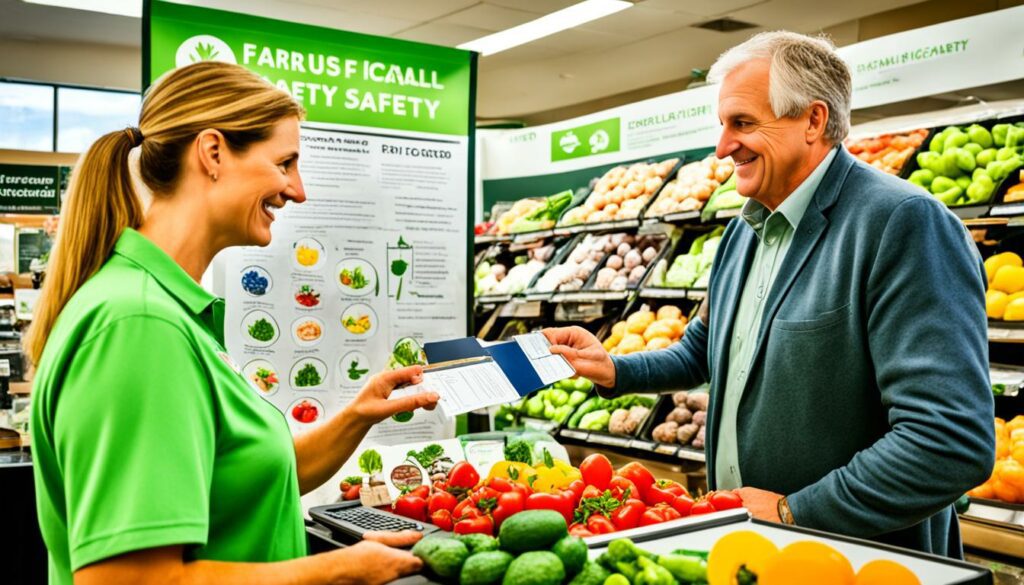
Between 1997 and 2002, direct sales of farm goods in the U.S. rose from $592 million to $812 million. During this time, direct-market farms grew from 110,639 to 116,733. The number of farmers’ markets also more than doubled, going from 1,755 to 3,706.
The FSMA, aimed at making food safer, has rules that direct farms must follow. Every place that handles food, including some direct farms, must tell the FDA about. But, farms that sell directly to people with CSAs or in farmers markets might not need to do this. Knowing who must follow these rules and who doesn’t is very important for farm sales legal compliance.
Good Agricultural Practices are vital for safe and honest farm work. They involve all steps from planting to picking, and they stress keeping things clean and recording what you do. For those growing fruits and vegetables, following GAP keeps food safe and cuts down on legal issues when selling direct.
In the Northeast, sales directly to customers went up by 40-53% from 1997 to 2002. Farms in this area sell more directly than the average in the U.S. This shows their strong use of direct selling.
| Year | Direct-to-Consumer Sales ($ Million) | Number of Direct-Market Farms | Farmers’ Markets |
|---|---|---|---|
| 1997 | 592 | 110,639 | 1,755 |
| 2002 | 812 | 116,733 | N/A |
| 2004 | N/A | N/A | 3,706 |
States like Connecticut, Massachusetts, New York, and Vermont did very well with direct sales, each increasing by 40-53%. Knowing and following the rules for direct farm sales is key to doing well and staying legal. Legal rules direct farm sales are important to get familiar with and obey for a successful operation.
Keeping all the right documents according to the FSMA and using GAP is very important for lowering legal risks in direct sales. This careful method ensures that the farm follows the law and builds trust and openness with buyers. This way, farm products become more trusted and credible.
Zoning and land use rules are very important for those selling directly from their farms. They affect both city and countryside areas. If you’re a farmer in town, check the rules to make sure you’re allowed to sell. You might need special permission for things that aren’t usually allowed. This helps you sell while following the law.
Urban and rural areas have different rules. Cities have lots of people and rules, so they’re stricter. For instance, in cities, you might not be allowed to compost or keep chickens. In the countryside, the rules can be more flexible but you still need to know them for sales from your farm.
In places like Ohio, areas without a city might have their own zoning rules. These usually cover things like how big buildings can be and where they can be built. But, these areas can’t make rules against farming. This matches the big laws of the state about farm sales.
Some things need special permission, like when the normal rules don’t fit. If you’re in a spot where farming isn’t common, you might need this. These special permits help ensure everything is safe and fits in with the area.
In some cases, like for farm shops or places making most of their money from the farm, there are special rules. Even tours on the farm can have rules about where people park or enter. It’s really important to know and follow these details for selling from your farm.
Here’s a quick look at the difference between city and country rules:
| Urban Zones | Rural Zones |
|---|---|
| More regulatory restrictions | Generally lenient regulations |
| Limited farming activities (e.g., no composting) | Broader agricultural activities allowed |
| Mandatory conditional use permits | Conditional use permits may vary |
It’s crucial to know and follow the zoning and land use laws for selling from your farm. This helps you work in a way that’s both legal and good for the environment.
The COVID-19 pandemic has changed how directly sold farm produce is looked at legally. The Ohio Department of Health’s RestartOhio suggests tight observance of health rules. Businesses selling directly to people must keep a six-foot distance, wear masks, and follow strict hygiene.
Those selling meat, preparing food, or handling risky foods face special rules. They must be extra careful to meet health and safety standards, which differ from place to place.
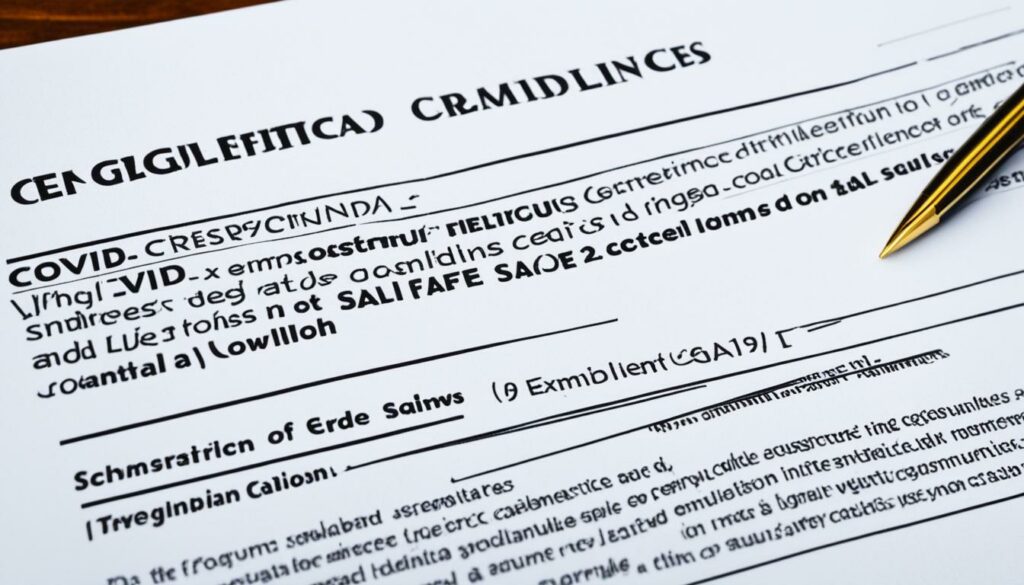
Farmers need to look at how COVID-19 influences selling food directly and via other means, like online. They should make sure employees and customers are safe, following all these rules closely.
Keeping a record of what you do to fight COVID-19 is very important. It’s not just about following the law; it shows your commitment to keeping everyone safe, including your customers.
Here is a list of what you must do to sell food safely during COVID-19:
| Requirements | Details |
|---|---|
| Social Distancing | Maintain six-foot distances or barriers |
| Mask Wearing | Masks must be worn at all times |
| Sanitation | Regular handwashing and sanitising protocols |
| Symptom Checking | Routine symptom checks for employees |
| Signage | Post signs indicating COVID-19 guidelines |
| Deep Cleaning | Frequent deep cleaning of premises |
| Case Management | Procedures for handling suspected or confirmed cases |
Following these rules helps ensure your farm is legally compliant and safe for everyone. It also shows you care about your customers and the community, even in tough times.
It’s key for farmers selling direct to know their sales tax duties. In places like Oklahoma, there are specific rules for farm sales. Farmers must understand these exemptions and rules to sell legally.
In Oklahoma, you can sell farm goods straight to consumers without paying state sales tax. This rule also stops county sales tax on these items. But, local areas can tax more items. Foods like goat’s milk cheese and fruit preserves usually have to pay sales tax.
Farmers need a vendor’s licence to sell items that are taxed. They must know the tax rules for each product they sell. For example, some fresh produce doesn’t need tax, but most processed foods do. Farmers should check the Oklahoma Tax Commission website for clear rules and what they must do.
| Category | State Sales Tax | County Sales Tax | Municipal Sales Tax |
|---|---|---|---|
| Directly Produced Agricultural Goods | Exempt | Exempt | Variable |
| Processed Agricultural Products | Taxable | Taxable | Taxable |
| Non-Agricultural Items | Taxable | Taxable | Taxable |
Farmers need to follow these sales tax laws closely. With the right licences and understanding of what’s taxable, they can sell without problems. This keeps them following all the sales tax laws.
When you sell meat and livestock products, there are many rules to follow. You have to process and label the products in the right way. For example, if you sell custom-processed meat directly, it must be processed by an approved plant. This way, the meat will have the right stamp and label, proving its quality.
You don’t need a special license to sell an animal for custom processing. But, if you sell the meat in portions, it must be processed at a federally approved plant. This is to make sure the meat is safe and follows all rules. It has to have the correct stamp and label.
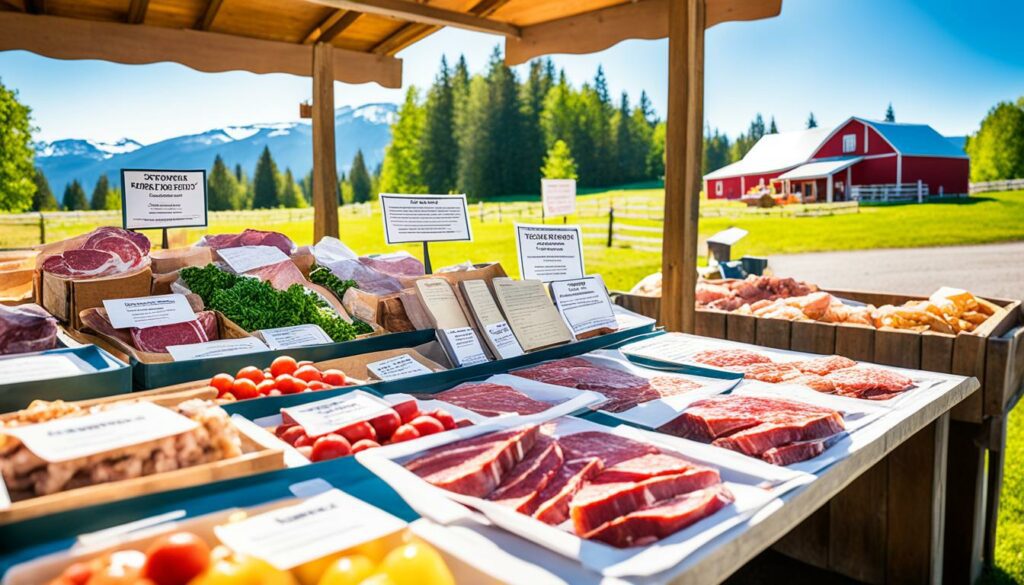
Keeping the right temperature is very important when selling meat. If you keep frozen meat for sale, you must have a warehouse licence. The storage area will be checked to make sure it’s clean and free from pests.
When selling at markets with a mobile set-up, check if you need a special food licence. It’s crucial to keep the meat at the right temperature while moving and selling it. Having the right licences and controls means you are following the law and keeping your food safe. It’s also important to keep talking to customers. This helps your business to grow, while you also comply with the rules.
The Michigan Cottage Food Law (PA 113 of 2010) makes it easier to sell certain foods directly to people. This law cuts down on the red tape, ditching the need for some permits and checks. But, it still asks sellers to follow some rules about what they put on their food labels and making sure it’s safe.
Farms can sell non-risky foods made at home right to people at places like markets. These foods aren’t the type that easily go bad, such as baked treats and preserves. Yet, there is a money limit on how much you can make, and you can’t sell them to shops, eateries, or online.
The Michigan law lists out many items that are okay to sell homemade, like sweet treats and some groceries. But, foods that can quickly spoil and make you sick are off the table. This is all to keep the food we buy safe.
This rule means folks don’t need a big professional kitchen to start selling their homemade goodies. Getting extra tips, like online safety training, can also help.
Putting the right info on your food’s packaging is key, according to the direct farm sales laws. Your goods must have a label that tells what’s inside and who made them. This info helps people know what they’re getting and where it came from.
Don’t forget about the rules made by local areas. They have their say, too. Following all these rules isn’t just about staying legal. It’s also a big part of keeping everyone safe and trusting the food they buy.
Selling directly from the farm, via markets or the internet, means you must focus on contracts. You need to clearly lay out the price, the product’s quality, when it arrives, and how you will be paid.
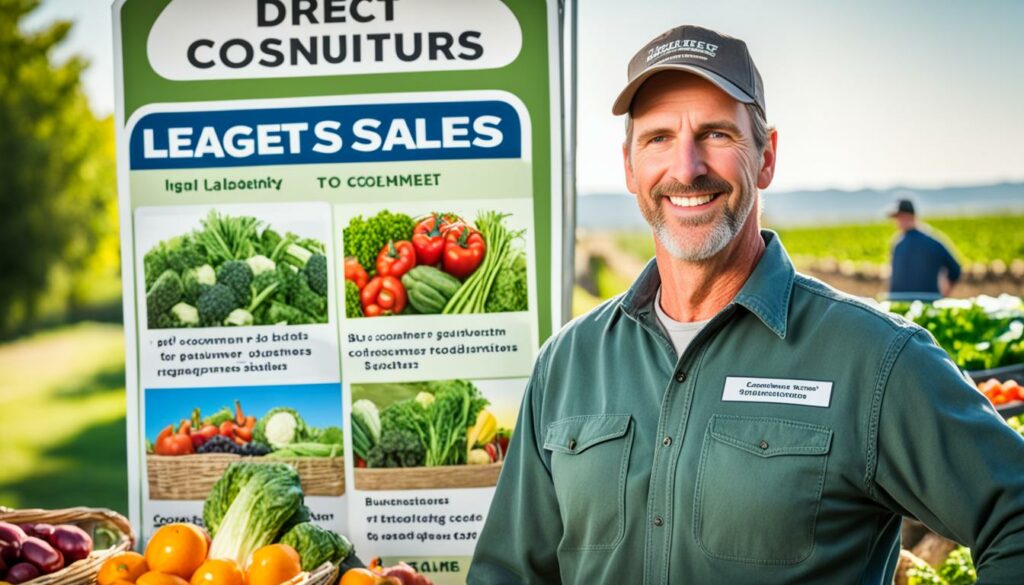
For direct farm sales, contracts should thoroughly cover payment, late payments, and when goods will be delivered. This helps make sure everyone knows what to expect, cutting down on arguments. Make sure your contract also covers how data will be used. This builds trust.
It’s easy to make mistakes in contracts. Not being specific about what ‘good quality’ means can cause problems. Also, forgetting to plan for emergencies could be a big issue. It’s smart for farmers to get advice from lawyers who know about farm sales laws.
By keeping up with the farm direct selling legal requirements, deals will go smoother and legal troubles will be less. Good paperwork and getting your contract checked are must-dos to make things work well.
Direct farm sales bring both great chances and big challenges. The legal side and following farm sales laws are crucial. Good insurance helps to lower these risks and keep the farm going strong.
For direct farm sales, certain insurances are key. Premises liability and transportation coverage are important. Also, product liability cover helps if food illnesses or injuries happen. Assessing and maybe improving insurance is wise for different sales activities’ risks.
Risk management is more than just having the right insurance. It’s also about recognising and addressing potential liability issues. In direct farm marketing, legal problems might include foreign objects in food or food diseases. Being careful and having good insurance reduces big financial and operational risks.
Talking well with insurers to ensure your policy really covers all risks is vital. This might mean adding more to your policy or raising the coverage limits. With direct farm marketing becoming more popular in the US, understanding these legal issues is crucial.
Expanding into direct farm sales brings chances and risks, especially in terms of responsibility. It’s wise to create a separate business, such as an LLC, to tackle these risks
By turning a farm into an LLC, you file specific documents and set rules for its operation. This offers protection against being personally responsible for the business’s debts. If you’re selling farm products directly, this step is very important.
It protects your personal wealth from being affected by the company’s problems.
An LLC keeps your personal and business money and assets separate. If you keep up with the LLC’s paperwork, your personal assets are safe if the business gets sued. This part of direct farm sales can keep your family’s money safe while letting the business grow.
It’s also smart to have the land separately held from your LLC. This way, the land is safe from any big legal issues the business might face. It’s a key part of making sure your business can continue even if something bad happens.
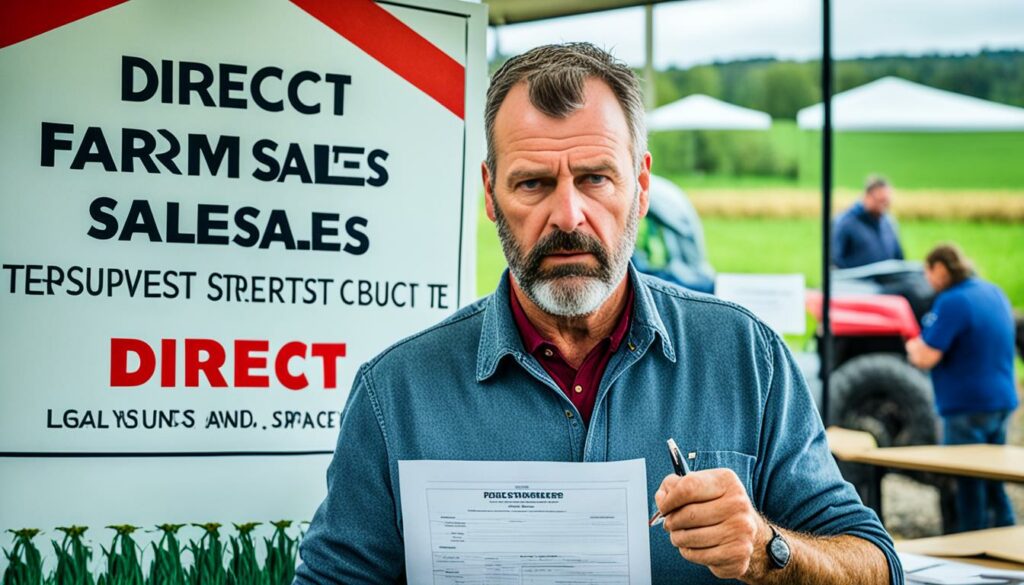
Picking the right business type also means considering taxes, how much control you have, and planning for the future. By keeping these points in mind, farmers can run a strong, legal farm business. This approach protects their way of living and the future of the farm.
| Business Structure | Liability Protection | Tax Considerations |
|---|---|---|
| Sole Proprietorship | Unlimited Liability | Pass-Through Taxation |
| General Partnership | Unlimited Liability | Pass-Through Taxation |
| Limited Liability Company (LLC) | Limited Liability | Pass-Through Taxation |
| C-Corporation | Limited Liability | Double Taxation |
| S-Corporation | Limited Liability | Pass-Through Taxation |
Direct farm sales can happen both in person and online. It’s vital to know the rules for selling at farmers markets compared to selling online. This knowledge is key for farmers to follow the law and do well.
To sell at farmers markets, you need the right permits. Farmers need a licence for retail food sales. They might also need a mobile selling licence, depending on the area’s rules. These permits make sure the food is safe and that customers and farmers are protected. Farmers may also need insurance at some markets for extra protection if something goes wrong with their products.
Selling online has its own set of rules. E-commerce shops must protect customer data, in line with digital privacy laws. They have to follow rules on shipping and sort out sales tax, which can vary from state to state. For example, in Idaho, all retail sales require sales tax, but in Washington, there are special rules for food and nursery items. Staying on top of these online rules is vital for farm sales legal compliance.
Below is a comparative table to illustrate some of the key differences between farmers markets and online sales:
| Aspect | Farmers Markets | Online Sales |
|---|---|---|
| Licencing | Retail food establishment, Mobile licences | E-commerce regulations |
| Tax Requirements | Varies by state, local sales taxes | Varies by state, potential shipping taxes |
| Insurance | Venue-specific requirements | Depends on business model and shipping |
| Data Protection | Not typically applicable | Mandatory compliance with data privacy laws |
In the world of direct farm sales, keeping good records is key. It’s not just a rule; it builds trust and credibility. A farm sales business must follow legal guidelines direct farm sales. This means keeping track of things like COVID-19 safety steps, staff training, and all money matters.

Different legal problems often challenge farm sales compared to regular farming. By keeping detailed records, these problems are easier to handle. For example, if a farm works across state lines, it might be seen as a “foreign” business. This needs more paperwork to meet the legal aspects farm direct sales rules.
Adding to the challenge, most insurance doesn’t fully cover farm-direct sales activities. It’s important to track your insurance well. This can help avoid problems and follow the legal guidelines direct farm sales. For taxes, like how Idaho requires tax on local sales, you must track money very precisely.
Not only does good record-keeping keep you from trouble, but it also helps your farm grow. It makes risk management easier and your operations clear. This is crucial for dealing with any legal issues and following legal aspects farm direct sales.
Knowing how long to keep records is also key. Sales records should be saved for three years, but some legal papers forever. So, keeping diligent records is vital for a legal, reliable farm sales business.
It’s key for farmers selling straight to customers to know the FDA’s rules. The Food Safety Modernization Act (FSMA) changes food safety laws hugely in the U.S. since 1938. It affects farmers and those selling food directly. Knowing these rules well helps avoid problems and keep selling straight to the buyer.
The FSMA calls a “facility” any farm that does more than grow crops. This includes things like CSA, farmers markets, and roadside stands. If you sell directly, you’re seen as a retail food place by the law. So, you don’t need to register. But, there are rules you must follow. These can keep you out of trouble and away from fines.
CSAs and farmers markets are affected a lot by these rules. They’re great for local communities and fresh food. But, they have to follow the FSMA carefully. Some fear these rules are tough, especially for small farm businesses. They worry it might cost too much to keep going. By knowing the rules, farms can stay in business and out of legal trouble.
The FDA says very small farms might need to spend lots to follow the rules. But, the rules can be confusing at times. Knowing which rules apply can save a lot of money and hassle. So, farmers need to stay updated on the rules that matter most to them.
Knowing these rules can actually make businesses better. It makes them ready to deal with new laws. This keeps them from breaking rules and facing hard times.
Getting involved in direct farm sales means you must know your legal stuff. It can be tough to understand all the laws about selling directly from a farm. However, it’s vital to keep your farm business strong. This includes things like finding land, obeying rules, and dealing with daily legal issues.
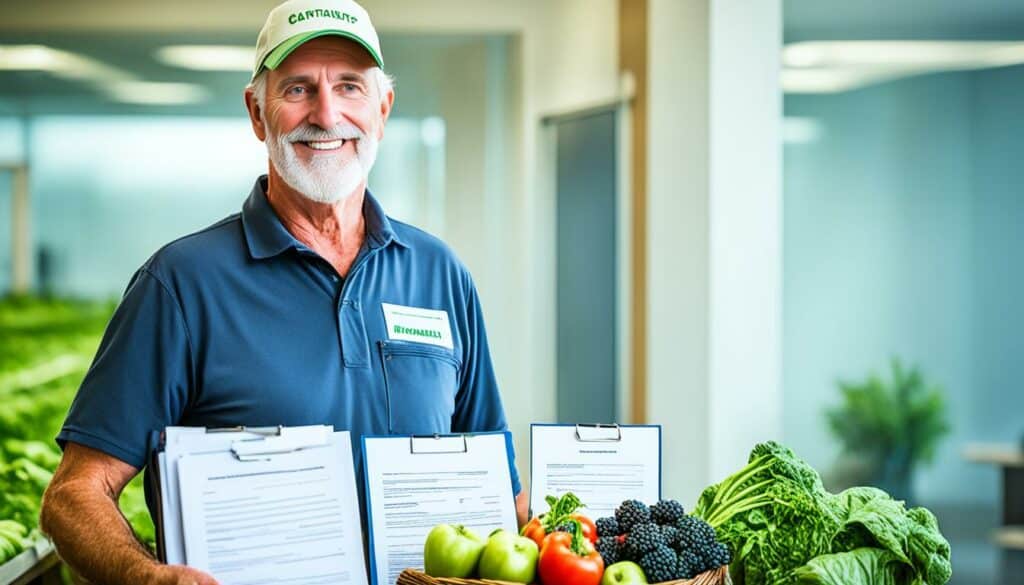
The USDA Farm Service Agency is key for new farmers. They offer loans every year to those who meet certain rules. There are also many USDA programs that help people buy farmland, especially for unique crops. But, getting these benefits can take a lot of time and work, which can be hard for farm buyers.
How farm properties are taxed can really change how much you pay each year. Knowing and following the law in this area is essential. The USDA Natural Resources Conservation Service also provides tools like the Web Soil Survey. It gives important details on the quality of farm soil.
Having enough water is crucial, especially where water rights are contested. Breaking the laws on water can lead to big fines or even crimes. Farms near cities have their own set of problems, such as laws on how to use the land, noise, and food safety because there are more people living nearby.
It’s important to get the right to use land legally, whether you buy it, rent it, or join a community land trust. Buying land gives you full control, while renting can provide stability. Sometimes, using land for a long time without permission can make it legally yours. Or, you might get a special agreement that lets you use the land in a limited way.
| Support Type | Description |
|---|---|
| USDA Loans | Direct and guaranteed loans for beginning farmers meeting specific criteria. |
| Property Tax Programs | Differential assessment programs affecting annual property taxes. |
| NRCS Soil Survey | Provides information on farm soil quality. |
| Water Access | Critical for farming operations, especially in arid regions with water rights issues. |
| Legal Compliance | Ensures adherence to regulations, avoiding fines and legal penalties. |
In short, knowing all about the legal side of farming is key to being successful. It involves everything from getting loans and dealing with taxes to following water laws and other rules. Understanding and managing these aspects well is vital for your farm to do great.
This exploration of direct-to-consumer farm sales showed us their bright future. In the U.S., there are about 8,284 farmers’ markets. These markets let farmers sell straight to shoppers, skipping middlemen and earning more.
In places like Pennsylvania, direct selling helps small farms earn vital money. About 80% of U.S. farms are small. It lets them keep more of their profits. But, it also means they have to know a lot about the law.
For those selling directly, there’s a lot to think about legally. They must be careful about foreign objects or food that makes people sick. Following food safety laws is crucial. There are many legal ways these issues can be seen, like fault or promises not kept. So, farmers need to be smart and ready.
To sum up, selling straight to customers is good but tricky too. There are many laws to follow, depending on where you are. Doing things right, like keeping food safe, can help farmers do well. It also helps them protect their business.
Direct-to-consumer farm sales require you to know many laws. You need to follow food safety and zoning rules closely. This ensures your business runs smoothly and avoids legal issues.
Permits are needed based on what you sell. For products like fruits and cottage foods, you may not need one. But, items like meats and eggs will require a licence.
Yes, some goods can be sold without a licence if they meet certain rules. For instance, fresh produce and non-hazardous foods can be exempt. But, these products must have proper labels and be handled correctly.
Following the Food Safety Modernization Act (FSMA) and Good Agricultural Practices (GAP) is important. These rules protect the safety of the foods you sell. They help lower the risk of causing foodborne illnesses.
Rural and urban areas have different farming rules. Farming is often less strict in the countryside. But in the city, extra permits might be needed for certain activities.
COVID-19 added new legal duties for farmers. You must follow health guidelines like distancing and sanitising. Doing so is key to keeping people safe and your farm running.
In some places like Ohio, only certain food items are taxed. For example, meals that people eat elsewhere are not taxed. But, beverages and ready-to-eat foods are taxed by farmers.
Selling meat needs extra care in how it’s processed and labelled. The food must come from checked facilities. Also, cold foods need to meet special rules for safety.
Cottage foods, including baked goods, must be labelled properly. If they follow safety guidelines, they can be sold without a licence. This is for things like cakes, jams, and dry items.
Contracts need to cover prices, quality, when you’ll deliver, and how you’ll pay. It’s wise to have a legal expert check these to avoid problems.
You must have good insurance for your farm, covering the place, products, and moving goods. It protects you from legal issues and claims.
Creating an LLC separates your personal money and the farm’s money. This way, if the business has a problem, your personal finances stay safe.
Farmers’ markets and online sales have their own rules. It’s important to follow both to sell well and legally.
Good records of health measures, law compliance, and money matters are crucial. They help prevent problems and keep your farm’s sales clear and accurate.
It’s necessary to follow FDA rules, especially if you sell direct to people via CSAs or markets. These outlets are normally not required to register with the FDA.